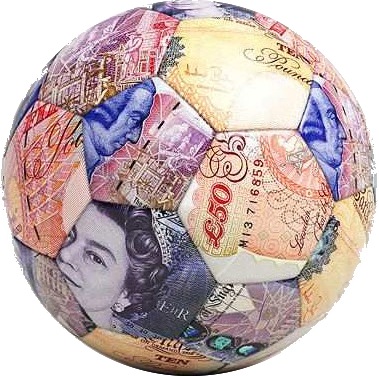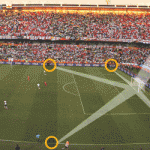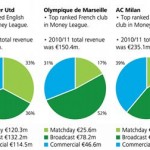This is a question every fan could answer at length, so how long have you got?
When I was young football was such a magical experience. My dad would take me to grounds everywhere in the days when for even top matches you could queue at the turnstiles and get in for an affordable price, stand on terraces or sit as you chose, see a great game unencumbered by overpaid prima donnas, diving or any of the other things that drag this once great game down. It was a simple game played for the love of football and for the benefit of fans, fuelled by a cheap pie and a cup of bovril at half time. What more could you want?
Over the years things changed, many following the disasters: the Rangers terracing, the Bradford fire, gang warfare among fans, Heysel, Hillsborough and more. But it’s money that really got between us and the game, thanks to the greed of FIFA and the FA, the clubs who want to push transfer fees into the stratosphere while others go broke from living beyond their means, the players or more specifically their agents, and everyone else who wants to inflate football into a money game rather than a simple sport played with a ball.
Money has corrupted everything – not that every sport does not need it to grow and develop, but when it appears every rat appears from every hole and it gets siphoned off to middlemen. Wage and transfer inflation is the headline, but behind the scenes everyone gets their whack – which is one reason football clubs don’t behave like normal businesses.
Everyone except the main protagonists would surely agree that the headline figures are simply absurd – how can any employee, no matter how scarce their skills (and they are just footballers at the end of the day) justify being paid £220,000 a week? Yes, we have UEFA’s “financial fair play” rules coming in – which are there to combat clubs making huge losses and “financial doping” by wealthy owners so clubs spend in proportion to their income, not to equalise the haves and have nots. So that won’t take away the fact that big clubs will always be able to afford far higher wages, will continue to monopolise the best players and to woo them from smaller clubs, and will continue to dominate leagues, particularly the Premier League with its rewards of money-spinning Champions League places on offer, which further enhance the inequality between clubs.
Clubs have been in a war of overspending rashly rather than bringing through players for some years now. Managers are sacked when a few games go against them. Short-termisim is rife in the game, yet no matter how precipitative the action taken by clubs there will always be someone finishing bottom and another two teams relegated. If commerce took the same as football, there would be a perpetual revolving door in most senior roles. Some clubs do take a longer-term strategic view, and they tend to be the ones who succeed (though arguably the Wenger experiment is failing in the eyes of most fans after well over 7 years without any trophy.) Throwing money at a problem is a short-term fix, but if you want a talented manager to build a dynasty you have to give them 3-4 years minimum, some but not unlimited funding, and be patient, knowing that along the way there will be some failures as well as some successes.
But if the clubs have failed and are repeatedly running into financial trouble, what of the governing bodies? For all the fact that this is our “national game,” the administration and conduct of association football has in recent years become a shambles. There’s no doubt that it has been corrupted by money, but you could also argue that FIFA has become, or maybe always was a squalid and corrupt body which cares not one jot about fans. Sure, it can organise competitions pretty well, though when you have so many millions the world over prepared to play and watch football games, it’s a bit like falling off a log.
The biggest complaints anyone could have against FIFA, an organisation that professes to protect and enhance football from the pinnacle of the professional game right down to the lowest level of grass roots soccer the world over is that they cocoon themselves away and pay far more attention to the money men than what ordinary fans and players need.
And the higher the monetary value, the more important each decision becomes – bad refereeing and inconsistently applied rules are affecting the outcome of games on a daily basis, but Blatter and the exec are far more concerned about rubbing shoulders with big money sponsors and keeping their own sinecures than making the fan experience better. Yes, like Nero they fiddle while Rome burns.
Let’s be clear about this: FIFAs view is that fans like controversy and a fast-flowing game. This is tosh: fans want the right decision made first time, every time. And they want technology in place to make sure that happens. Very very belatedly they are starting to introduce goal-line technology based on the Hawkeye system, which in other sports has been around for many years, and only after refs and their “assistants” failing to give goals that were blatantly over the line, or on other occasions giving goals which obviously were not. If everyone else in the stadium can see the ref is wrong, how is it justifiable to accept a wrong decision? Worse still, there are instances when no amount of officials FIFA throw at the problem, they are still human can can’t be certain whether the ball has crossed the line or not.
This is way before we begin to consider the use of video replays, which to date have been rejected, much like Canute pushing back the waves, or other uses of the available technology, which works just fine in sports like rugby, in spite of it being much the poorer of the two. Last Saturday was a typical example – one match was won (by my team as it turns out) by a goal scored by a player coming from an offside position, while another match should have been won by a goal which was ruled offside but wasn’t (by the loathed Liverpool, but the point is still valid!) What are linesmen for if pundits can spot their wrong decisions from a hundred yards, but they can’t see in plain view that their decision is wrong? Clearly technology should be making such calls automatically.
Refereeing has always been a major issue, but even in the days of professional refs it is only getting worse. The most recent incidence was the performance by Mark Clattenburg in the Chelsea v Man United game last Sunday. Regardless of the rights or wrongs of any one incident, the ref had just three options available to him: take no action at all, with or without a lecture, give a yellow card or give a red card. Not even the possibility of sanctions like the “sin bin”, moving a free kick forward for dissent (which was tried some years back but apparently discontinued),
Actually, Mr Clattenburg and other refs have found a new way to prevent the correct offender being punished since UEFA started their offensive against diving, which everyone agrees is bad and wrong and should be stamped out. What do they do? Award free kicks for genuine dives, punishing the innocent offender in the process, but they book players for diving when they have genuinely been tripped. It’s baffling, and yet another example of how putting trust solely in human beings on the field, and giving them a split second to make a decision, is utterly wrong when you have much better ways to ensure the decision is correct every time.
Then we have the recent decisions about racist language on and off the pitch, which the authorities are struggling to treat with any sort of understanding or even with exemplary punishments, and this is before we think about the continued homophobia within the game, another issue that has been handled sensitively elsewhere.
Why is football governed by such backward imbeciles? The typical defence has been that “bad decisions even out.” This is tripe! What it says is that FIFA has a tolerance level for a high proportion of appalling decisions in favour of one team or another, but so long as one team is not given favourable treatment that is perfectly acceptable!
They also say that even if you have video technology, a human being still has to make the decision. True, but if they aren’t equipped to see the incident properly, how can the game justify leagues being won and lost, promotions and relegations being decided, careers being ended on the basis of crassly awful decisions?
Put it another way: as a sometime fan who occasionally takes his lad to see games, often lower-division but also the odd PL fixture, and even the Olympic semi-final at Wembley, I find attending football matches unacceptably expensive at every level (tickets, refreshments, everything – and no, I don’t want a season ticket for any club, thank you), and that even when I do go entertainment really has not kept pace with the cost hikes. You get far better entertainment and value for money at cricket matches, in my humble opinion. I don’t have Sky sports, nor will I be subscribing any time soon. If the football authorities and clubs and players continue to behave like schoolchildren, there will come a time when I and many thousands like me simply won’t bother.











